Inside: Learn common things minimalists don’t buy or own to simplify their lives and homes.
In today’s world, the temptation to buy stuff is everywhere.
If you’re trying to embrace a minimalist lifestyle, it’s important to resist the perceived need those advertisements create.
Instead, prioritize owning the essentials and knowing how to say “no” to the rest.
But how do you know what to indulge in and what to avoid?
While every minimalist has a slightly different vision of what’s truly essential and what isn’t, there are a few common things that most minimalists don’t own.
If you want to live a simpler, more minimalist lifestyle, here are a few guidelines to consider following.
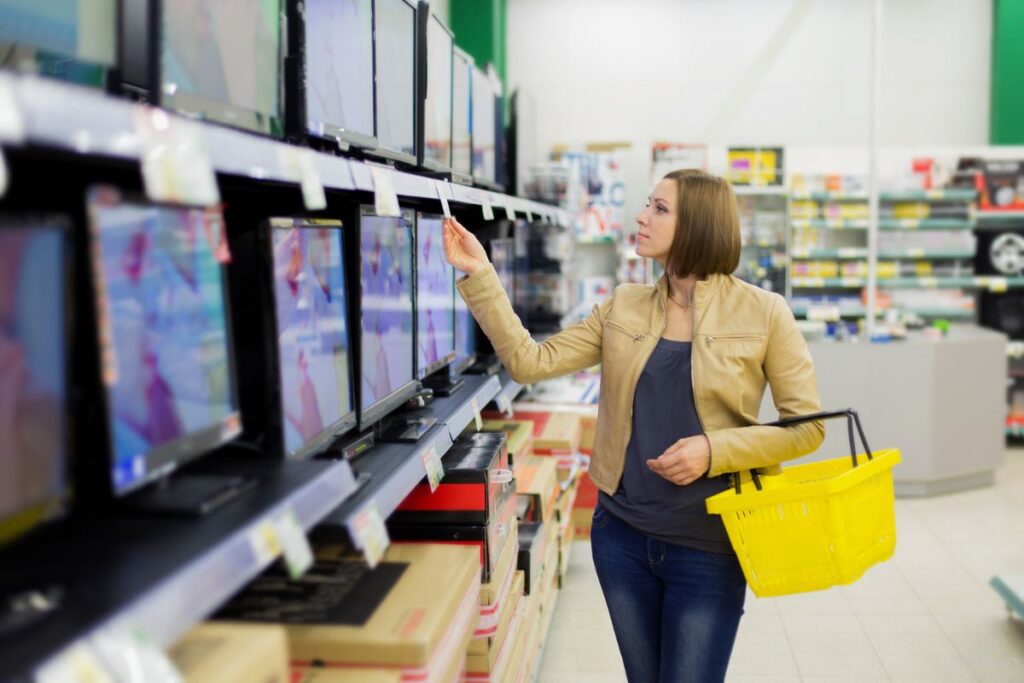
What are some things minimalists don’t buy?
Even though I don’t consider myself a minimalist, I share many of the same values. Minimalism is all about simplicity and the idea that less is more.
By focusing on the things that truly matter and bring joy, and getting rid of the rest, we can live a less cluttered and more fulfilling life.
So, what are minimalists not buying to keep their lives and homes simpler? Here are 10 of them.
1. Minimalists don’t buy knick-knacks and needless decorations.
Some people find joy in decorating every square inch of their space with tchotchkes, knick-knacks, and other bits of home decor.
But minimalists? They would rather avoid the clutter that tends to accumulate when you take a “more is more” approach to home decor.
Instead of covering every shelf and surface with stuff, minimalists take a more thoughtful approach. They may opt for a single vase of fresh flowers instead of an assortment of picture frames and figurines.
And instead of collecting endless seasonal decorations to spice up your space and celebrate every holiday and shift in the weather, they choose to keep things simple, with versatile decor that’ll bring them joy all year long.
By resisting the temptation to excessively decorate, minimalists create a space that embraces calm and tranquility.
An added bonus? It’s much easier to keep things clean and dust-free.

2. Minimalists try to avoid buying fast fashion.
Over the years, fast fashion has become the go-to way to dress for many people.
And in some ways, it’s easy to see why. It’s affordable. It’s accessible. And it makes it relatively easy to keep up with the latest ever-changing trends.
It’s also an easy way to wind up with an overwhelmingly large wardrobe – and contribute needlessly to waste as that fast fashion rips, tears, and falls apart quickly.
Instead, minimalists extend their ‘less is more’ philosophy to their wardrobes and declutter what they no longer wear. They keep well-made, timeless pieces that offer versatility.
Minimalists are selective when buying new pieces. Those looking to save money and increase sustainability often shop at second-hand stores for clothing.
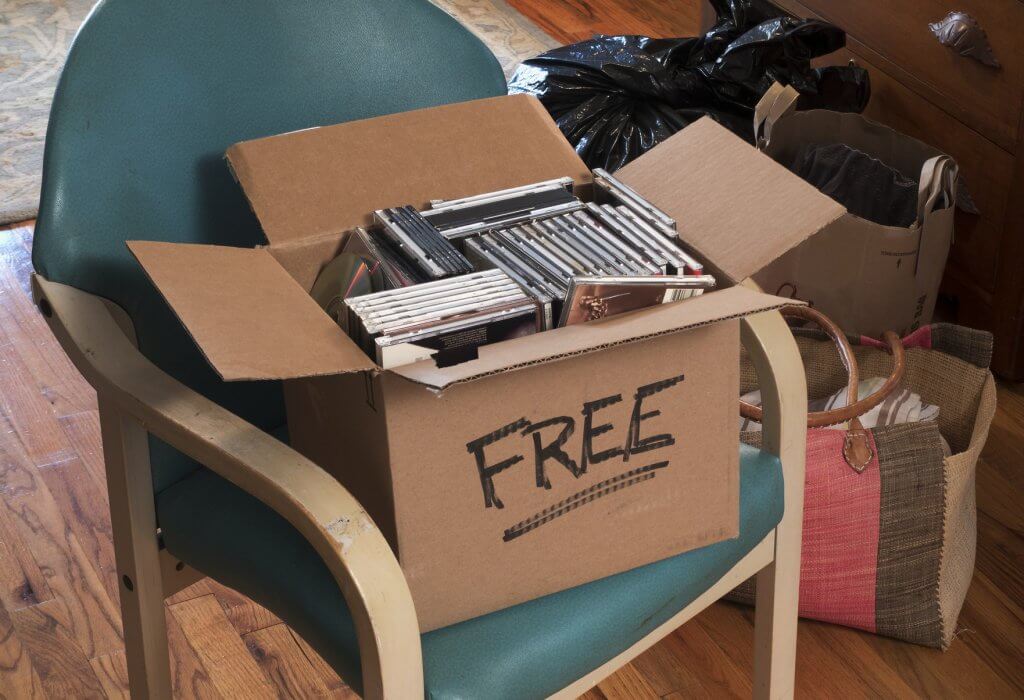
3. Minimalists often don’t own physical media.
Many of us grew up in homes filled with physical movies, music, and books. Depending on when you were born, you had stacks of VHS tapes or DVDs.
Records, tapes, or CDs were the only way you could listen to your favorite songs without hoping you’d get lucky and catch them on the radio. And your bookshelves were probably full of books that you’d only read once, collecting dust ever since.
Now? All of that media can be saved and accessed digitally. We no longer need entire pieces of furniture dedicated to storing those CDs and DVDs.
Streaming services allow us to watch our favorite movies and shows and listen to our favorite songs with the touch of a button, and e-readers eliminate the need to keep stacks upon stacks of books around our homes.
And while some people still insist on buying physical media, it’s one thing that minimalists often categorically skip to have less stuff in their homes.
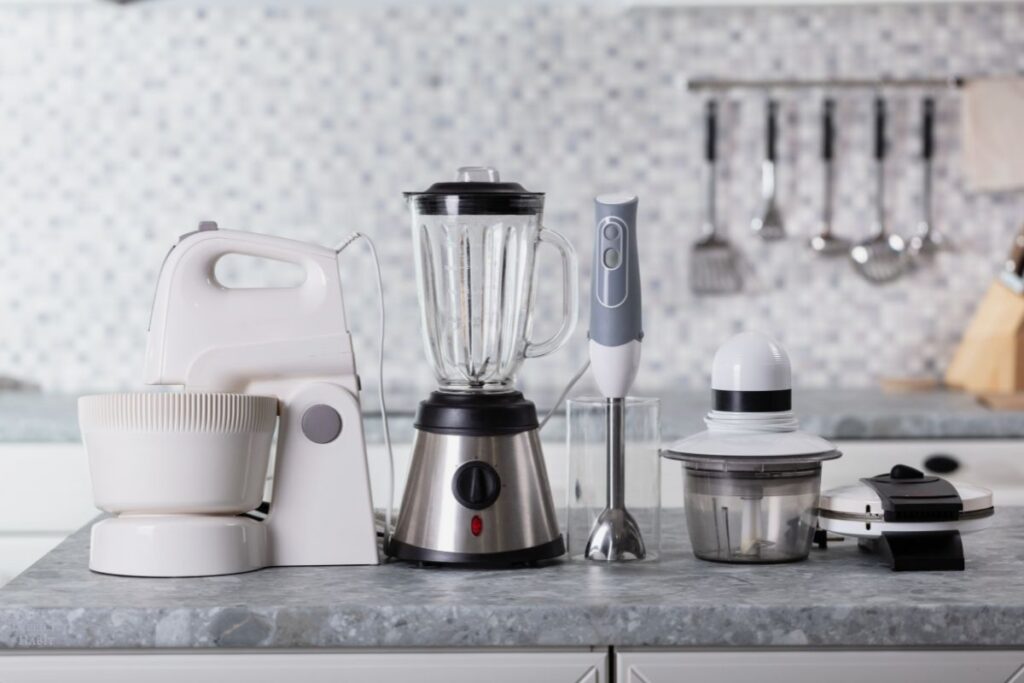
4. Minimalists don’t typically buy single-purpose kitchen gadgets.
There’s a kitchen gadget out there for virtually everything.
Avocado slicers. Apple corers. Garlic presses. The list goes on. For every task and item you can find in your kitchen, someone’s created something specialized that helps you prepare it.
But none of those things are really necessary. You can slice an avocado, core an apple, and mince your garlic with a single, multi-purpose tool – a good kitchen knife. So why buy all of those other things?
Instead of filling their cabinets and drawers with unnecessary kitchen gadgets, minimalists stick to the basics: versatile appliances, sturdy pots and pans, must-have utensils, and just enough dishes.
A minimalist kitchen that’s stocked with the essentials and well-organized makes cooking easier and more enjoyable.
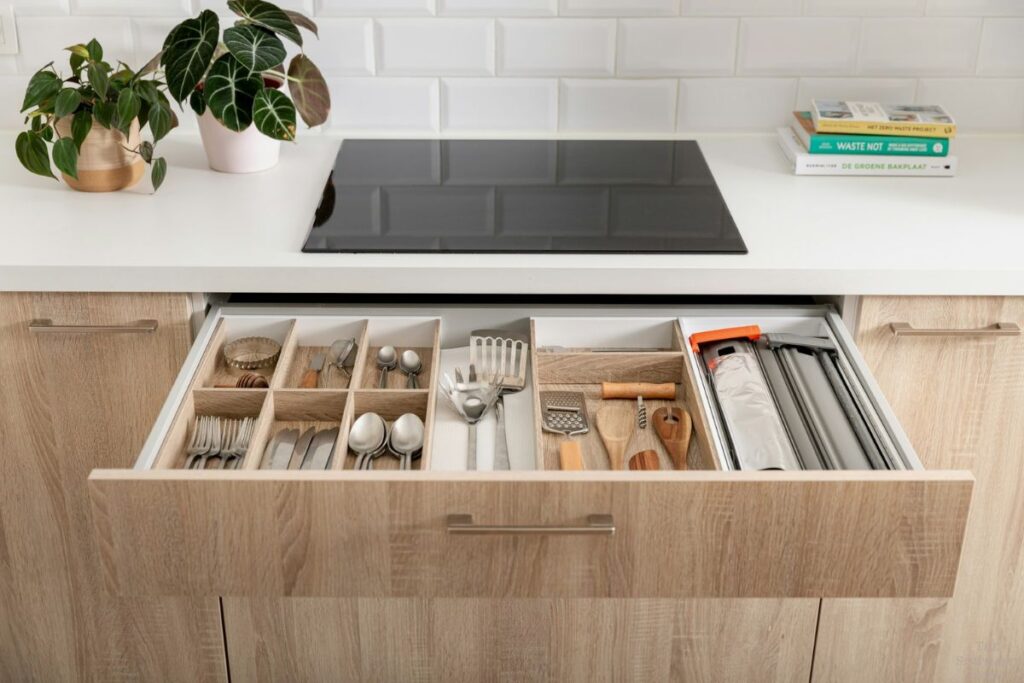
5. Minimalists don’t own many duplicate items.
Sure, you can have more than one of something… but there’s a fine line between ‘just enough’ and ‘way too much.’
Some people like to keep lots of extras on hand – an endless pile of extra towels and dishcloths, six different sheet sets, a box filled with duplicate cords and cables just in case you ever happen to need them someday.
A stack of ten plates in the cupboard, more pairs of jeans than you could wear in a month, four different lotions in the bathroom…the list goes on.
But why?
Instead of owning all that stuff, minimalists would prefer to focus on owning fewer, higher quality items – a couple of good bed sheets, enough towels to get through the week, quality dishware, and clothes.
While they could overfill closets and cupboards with extra stuff simply because the space exists, they choose not to because they know they don’t need to.
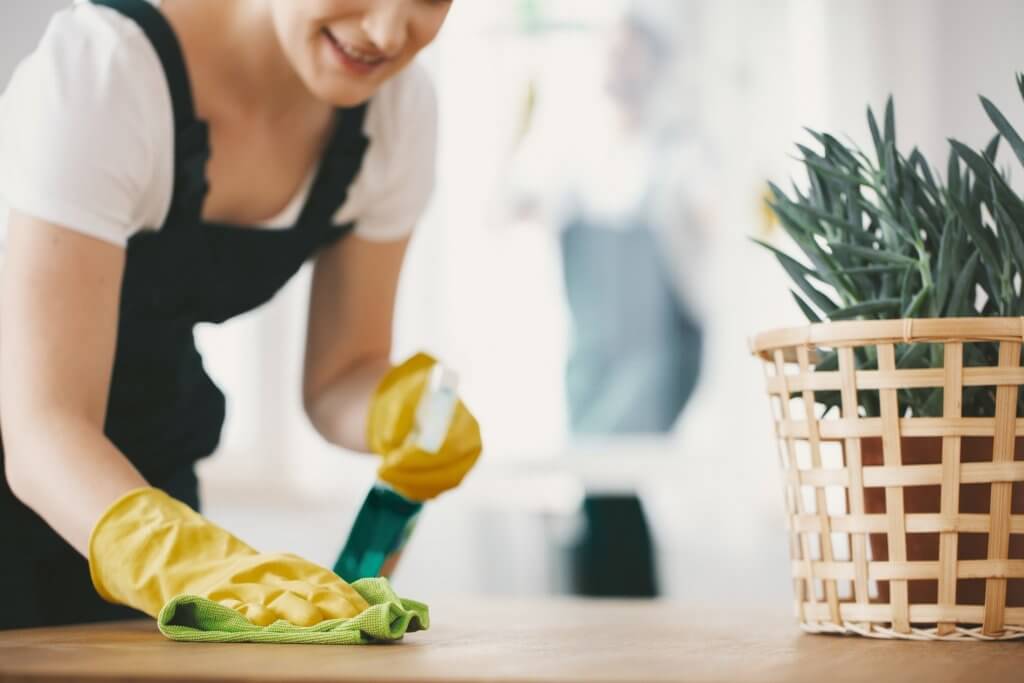
6. Minimalists don’t buy lots of cleaning supplies.
There’s a product out there that swears it’s designed to clean everything – your stovetop, your kitchen sink, your hardwood floors, your mirrors, your toilets.
But you don’t really need all of that.
Instead of splurging on endless sprays, wipes, and solutions, many minimalists know that you can stick to minimal versatile products and great cleaning tools to tackle every area in your home.
Once you find what works for you, there is no need to continue trying out the new trendy cleaning products.
Minimalists focus on their favorites and don’t constantly feel the need to change things up.
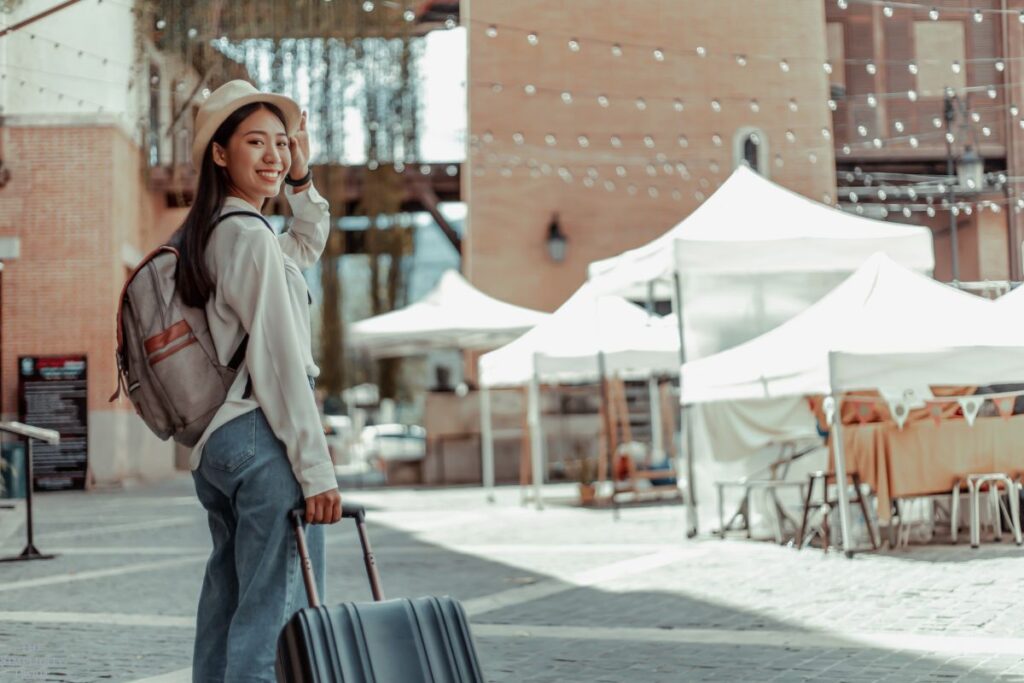
7. Minimalists don’t purchase souvenirs on every vacation.
Minimalists tend to place a priority on experiences and traveling to new places rather than acquiring more stuff.
One thing minimalists choose not to do when they go on vacation? Bring home souvenirs.
Minimalist travel focuses on packing light and being present in the moment. Taking pictures is a great way to remember places you have been and people you spent time with.
But souvenirs? They can end up becoming clutter and are unnecessary baggage.
While taking something home once in a while may be nice, they focus on consumables rather than items that would sit out collecting dust.

8. Minimalists don’t make impulse purchases.
Another thing that minimalists do their best to avoid? They don’t get sucked into impulse purchasing.
Minimalists learn how not to get lured into buying something just because it’s on sale.
They’re intentional with shopping and are careful about what items they choose to bring into their home.
This saves them from experiencing buyer’s remorse often and helps keep clutter at bay while saving money in the process.
Minimalists put practices in place to help them avoid impulse purchases such as waiting for a predetermined amount of time before deciding whether or not to buy something.

9. Minimalists don’t buy typical gifts.
Minimalists have learned how to be intentional with their purchases and are careful not to add clutter to their homes.
In doing so, they’re also aware when buying gifts that they don’t want to contribute to the clutter in anyone else’s home either.
Because of that, minimalists tend to give clutter-free gifts. They focus on consumable items or experiences that they think the recipient would enjoy.
Minimalists tend to want to receive these types of gifts as well or may even opt not to exchange gifts during the holidays.
Does that mean they won’t buy you a different gift if that’s what you’ve told them you really want? No, but left to their own devices people do tend to give the types of gifts that they’d enjoy receiving.

10. Minimalists limit one-time use & disposable items.
Another thing minimalists try to significantly limit is one-time use and disposable items. Some of the items in this category include paper towels, napkins, plastic wrap, single-use water bottles, paper plates, and plasticware.
Many minimalists are more eco-conscious and would rather use more sustainable alternatives.
Thankfully there are a lot of great reusable options available thereby reducing waste while also decreasing the amount of things that need to be stored in the home.
Opting for fewer one-time use and disposable items not only keeps more trash out of landfills, but it’s also a great way to save more money.

Things I stopped buying
Decluttering was quite a learning experience for me. Through it, I learned how to be more selective with what I purchased.
I stopped buying these 15 things after simplifying our home as they were creating clutter.
This year I decided not to purchase these 27 things either because we already had enough or we simply didn’t need them.
Your lists will likely look a bit different from mine, which is completely fine. The most important thing is to be mindful of what you buy. It will save you money and prevent clutter from accumulating in your home.
What would you add to this list of things minimalists don’t buy? Leave a comment and let me know!
Sign up on the form below to get weekly decluttering tips and inspiration sent straight to your inbox. You’ll also get the free 5 Areas to Declutter in 10 Minutes Checklist to help you get started decluttering today.


Minimalists don’t purchase in bulk. Minimalists don’t purchase plastic storage tubs.
Great additions to the list 🙂
Certain items make sense to buy in bulk if you have children.
I agree, Sara. It’s one of the reasons I don’t consider myself a minimalist 😉
Minimalists dont buy a lot of beauty products!
good addition!
if you’re a proper minimalist you won’t have children……
True that!
If by buying in bulk, you mean buying large boxes and packages of things, true. But I think minimalists can definitely buy in bulk by bringing their own reusable container to the market or supermarket, and buying some of this or that which is offered in bulk (like grains or nuts, or example). It’s a great way to buy what you need and actually consume, while using up zero disposable packaging.
During all the years we raised 6 kids, I never bought trash bags. There were always plenty of free, reusable shopping bags, & lining trash with them took a little more time (but ensured that the trash got taken out more often!) BIG savings!
– minamalist if living in a condo would not pay extra for storage as they know it will get filled.
– buy multi purpose furniture like sofa cum recliner cum bed
– buy clothese that can be mixed n matched
– if buy a book they pass it on after reading
– thrift more than buying new items
She mentioned consumables don’t clutter, because they are used up.
Exactly.
Exactly. I’m a minimalist and I always get compliments on my home decor. It’s a beautiful, calming space; clutter-free, and the spare decorations are top-notch only. When you spend less you have more money to splurge! Quality over quantity, always.
The articles is indeed enlightening. I have in mind to declutter but I also need time to venture on it. I plan to do it when school is out.
This article describes me. I don’t think of myself as a minimalist but as an eco-oriented consumer.
Minimalists don’t buy shoes and handbags in every color.
very true
I’d have to get rid of ny husband. i never bought most of the stuff listed.but him, oh he’s the gadget, paper plate, paper towel, knicknake, DVD, CD buyer, just for a few objects he just has to have. i went fro. having one kitchen drawer for kitchen supplies to five.
I have no desire to be a minimalist but I need to develop and think about some of their habits. My house is full of clutter and once I finally get rid of the clutter I don’t want to clutter it up again. My late husband was a pastor and I have gone from living in parsonages with 4 bedrooms to a 2 bedroom house. Even thought I gotten rid of lots of stuff I still have lots of stuff. Plus I have some items from my mother’s after she died. I am also sentimental. Is there hope for me?
Hi Martha,
Yes there is definitely hope! You don’t have to want to be a minimalist in order to declutter and keep your space clutter-free. There are some helpful tips on getting started in this post: https://www.thesimplicityhabit.com/how-to-start-decluttering/
the memory is in your heart and not in holding on to the items.
I love how beautiful your words are.
Not only is there hope for you, but there is absolutely nothing wrong with you! Honestly, there would be something wrong with you if you didn’t keep some of your mom’s things and had no sentimentality.
I’d say to keep weeding out things that are actual junk and things that are meant to be functional but that you have no use for personally, unless they have special significance to you. And whatever you do, make sure it’s what you actually want to do, and not what anyone else tries to make you feel like you should want to do. There is no moral superiority in owning fewer things and there is much potential for regret in being unduly pressured or guilted into getting rid of things.
“There is no moral superiority in owning fewer things…” Thank you for saying this. It bothers me no end the sense of moral superiority, entitlement, and pretentiousness that weaves through discussions about minimalism as a lifestyle and as an esthetic.
I read this list and every single one applies to me. I think this list goes hand-in-hand with being budget conscious.
me too! every one applies to me. I think it’s also related to being eco-conscious, and traveling light.
Great read, I’ve struggled with over buying, creating clutter.
I agree with this list EXCEPT for physical media. If there is a book or movie you love you should most certainly own a copy rather than be at the whim of streaming services. Same with books. Physical media is going bye bye forever in many cases, and certain books and movies have become VERY valuable because of it. Don’t fill your home with it, but you should absolutely own a physical copy of the books and movies you hold most dear.
My library contains 1146 books and they aren’t going anywhere. I am a writer. Writers require books, not Kindles.
Minimalists replace. When I buy something new, I usually get rid of something old. Of course, I’m old, so I’ve done my acquiring previously. (But I still have too much stuff.)
NEW cars
I buy a two year old car and keep it in good working condition for ever.
my everyday toyota is now 20 years old.
the sports car I bought in my 20s is now a 45 year old weekend used classic.
Ive always suspected I was a minimalist but this article and the comments confirm it…every single behavior and those added in the comments. That said, I still struggle with clutter which stresses me out…I haven’t figured out how to be organized with what I do have…a hallmark of adhd.
Every family must find its own balance between sleek and fussy. I must have some plastic forks, etc. for picnics since we don’t always rush home after we eat. I save any plasticware from carryout food and put it through the dishwasher. This ‘recycles ‘ it once more and I throw it out post-picnic with no guilt. Bonus: no basket of dirty utensils facing me when we arrive at home!–Anne
Late in my years, I have become a “minimalist” if I want to put a “label” on my identity in regard to behavior that impacts ones emotions, mood, environment, mind, heart and soul! Actually, it was my grandson and his girlfriend who inspired me to go this route….I now love it! I grew up in a time when need dictated one to keep supplied! So, things grew and multiplied! ha! Now I am retired from a successful career, I love that I have, and continue to, “simplify” my life in all its patterns! I am finding more time to really appreciate so much more in my life….rather than going “thru” things, or feeling overwhelmed because “too much” was just that “too much!” I believe it takes time and “positive choice making” without being too hard on yourself….just moving ahead determined with the day’s goal and complimenting yourself when you have achieved it. These all add up to creating a simple life that brings inner peace, good health and much joy….to yourself and those around you!
Are all minimalists as obnoxious as articles like this make them sound? I know many are, but I always like to look for reasons not to paint entire groups of people with a broad brush and to be more understanding of and have more pity for people’s odd, compulsive behaviors.
The goal of this post was to point out things most minimalists don’t own. That doesn’t mean you don’t have to own these things. It’s intended to be a helpful starting point for giving thought to what you buy and bring into your home.
Yikes!
At 80 I’m becoming a minimalist. I’ve lived all over the world and had several remarkable careers but moving into a small cottage house , I’ve eliminated a lot. I keep my favorite items from Africa, Maine, Montana and California and donated much. I encourage others to live simple too.. it’s refreshing
I would like to be a minimalist whilst I am very close to be. My house is declattered and neat, but actually I am studying embroidery and it’s difficult not to buy a lot of stuff to try (chenille, all kinds of pearls and threads, difference types of needles to try on, educational purpose books etc). I upcycle my clothes to wear them linger. Also when we travel, we use to buy some souvenir stuff but only functional and with incredible craftsmanship like a original clay handmade bowl for serve bread in Sicily or pretty locally made water glass in Finland…
Greetings from France.
Some good ideas here. But I paint and craft. It’s hard to keep the clutter at bay when you don’t know what you’ll need for your next project. Not to mention all the lovely art I haven’t sold sitting around.
I moved from my 5 bed house to a 2 bed and had to dispose of a LOT of stuff. I just have what I need now and enjoy my smaller home. I still miss my old house though….. ❤
I think the intentions are good with this article but the tone came off wrong. You never want to call someone’s souvenir and collectibles and picture frames clutter and unnecessary. I am happily mostly opposite of this article. I do decorate it’s my main art and hobby. I have everyone from delivery people, to neighbors, even paramedics when my dad was sick commenting on how happy and refreshing it made them feel. They always look forward to what I put up next. I don’t think it’s useless if it makes me happy. The bonus that others love it even better. People buy souvenirs because they are in the moment realizing it’s something they can’t get at home. Also where do you put the pictures you take if picture frames are clutter? I think it’s pretty gross not to have extra towels , what do you do if you get slightly behind on laundry? Also if you have less that’s more water being used and more detergent because you are using them more since you only have a few which is not environmentally friendly. I think at the end of the day. Going with this idea and article. A person is left with mostly empty cupboards, empty drawers and place that could as easily be mistaken for an office or a impersonal hotel. The whole thing just seems so empty. Lack of emotions and heart and flavor. I feel like these people have all white kitchens with stainless steel counters like they have in hospital rooms. Very sterilized and unfriendly. I think it’s a good idea to not over spend and to buy high quality instead of cheap. I am with you on that a 100 and in using glass storage containers and not plastic. I even go as far as to say don’t buy all electric cars because the batteries don’t biodegrade. Let’s see cars made out of something even cleaner. Anyway I think your tone is why some take offense. The best part of decorating for every season is it helps remind and connect you to the one you are in and I still go out and have experiences. Also if you are in a bad season it’s a good reminder that season do indeed change. Also in my years of ministry and with. Theology degree of my own and years of selling and buying these so called useless things. I can tell you no one’s life is simple everyone has there story and struggles. I think you should offer solutions or organize people memories souvenirs and collections. Clutter to me is being messy, if you organize you stuff it’s just as freeing and relaxing and you can still enjoy it. I think that would be. Great article for you especially as a mom and professional it’s not easy. I respect what you. I really think it’s all in how you say it.
Thanks for sharing your thoughts, Kelly. As I stated in the post, I do not consider myself a minimalist and this was a list of 10 things minimalists don’t typically buy or own. There will always be some exceptions, but generally speaking the items listed are ones that minimalists don’t tend to have (or at least don’t have much of). It wasn’t an attempt to tell the reader that you can’t own any of these things. It’s up to each person to decide what their comfort level is with stuff and to determine what is clutter in their home. Ultimately you should do what works for you.